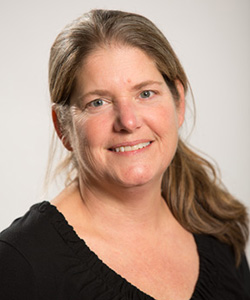Three faculty members have been named UWM distinguished professors by current faculty holding that title. The current active number in this prestigious group is now 26.
Those receiving the honor are Patrick Brady, Martha Carlin and Sandra McLellan.
UWM distinguished professors are chosen for the significant impact they have had on their fields of study, their remarkable productivity and international reputations. Since 1973, 66 faculty have been chosen for the title. The new members are:
Patrick Brady, a professor of physics in the College of Letters & Science, is an international scholar of general relativity. He has been the principal investigator on $32 million in funding from the National Science Foundation, and co-PI on an additional $12 million. These funds have supported gravitational wave research and research instrumentation for high-performance computing facilities.

Brady has been director of the Leonard E. Parker Center for Gravitation, Cosmology, and Astrophysics at UWM since 2009. He also is an elected fellow of the American Physical Society since 2010 and has chaired the society’s Division of Gravitational Physics. Other research awards include an Alfred P. Sloan Research Fellowship (2002–2006), and a Cottrell Scholar Award (2002–2007) from the Research Corporation for Science Advancement.
In 2019, Brady was elected spokesperson of the LIGO Scientific Collaboration, post he still holds.
As spokesperson, Brady is one of the leading figures of an international collaboration of more than 1,400 scientists from 127 institutions distributed over 19 countries.
Martha Carlin is a professor of history in the College of Letters & Science and is a scholar of medieval and early modern England. Her work focuses on urban history, especially London and Southwark, and on everyday life, including food, work, shopping, letters, household technologies and inns.

Carlin is the world’s leading authority on medieval and Tudor Southwark, the turbulent community across the Thames from London. Southwark was the site of the Tabard Inn, where Geoffrey Chaucer set the opening of “The Canterbury Tales,” and the Globe Theatre, where William Shakespeare’s plays were performed.
In recent years, Carlin’s archival research has yielded important new evidence concerning the lives of both Chaucer and Shakespeare, and her extensive discoveries on Chaucer’s friend and fellow poet John Gower, who lived in Southwark in his later years, enabled her to write a revolutionary biographical study of his life.
Since 1996, Carlin has been a fellow of the UK’s Royal Historical Society, a great honor for an American.
Sandra McLellan is a professor in the School of Freshwater Sciences and a scholar of environmental and public health microbiology.

Since joining the faculty in 2001, she has attracted more than $15 million in external funding, including grants from the National Institutes of Health that helped her to develop better indicators for identifying serious contamination concerns in water, such as sewage overflows and agricultural and urban runoff.
Her work in wastewater surveillance of disease is making major impacts on public health.
With the state Department of Health Services and the state Laboratory of Hygiene, McLellan has helped implement such a program that generates COVID-19 data for Wisconsin. The data they generated have been publicly available on a dashboard since December 2020. She also has provided technical expertise to the CDC’s National Wastewater Surveillance System.
In 2020, she was named a fellow of the American Academy of Microbiology and this year was awarded the first Lynde B. Uihlein Professorship in Ecosystem Health.





